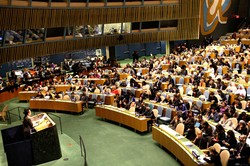For Stephanie Quintana, the United Nations’ 59th Session of the Commission on the Status of Women was more than another educational opportunity or information gathering meeting. This year’s event touched her much more deeply.
“This was so intense,” she says. “It was so emotional for me in so many ways. Several times, I found myself so overwhelmed I didn’t know how I would get past it … but each time, I did.”
Quintana was one of eleven young Presbyterian women who received scholarships to attend the Commission from the Office of Women’s Leadership Development & Young Women’s Ministries of the Presbyterian Mission Agency. She joined ecumenical women from around the globe to discuss an array of shared concerns including women and poverty, education and training of women, violence against women, and women and the economy. The focus of this year’s Commission was the 20th anniversary of the Beijing Declaration and Platform for Action – an agenda focused on women’s empowerment that aims to remove all the obstacles to women’s active participation in all spheres of public and private life through a full and equal share in economic, social, cultural and political decision making.
“For me, this year’s commission was so powerful,” she says. “In my work, I walk the line of being an advocate for the women that I work with while also bearing witness to what they are going through – dealing with issues of gender-based violence, deportation and immigration issues. In dealing with many of these issues, and working with these women, sometimes you become numb to the realities of what’s surrounding you. This year’s Commission reminded me that it’s important to feel these experiences – and that I’m not alone in this fight. To find common struggles that cross cultural and geographic boundaries was devastating and empowering all at the same time.”
Quintana works for the Florence Refugee Project in Florence, Ariz., as a legal assistant, where she spends much of her time advising men and women who are engaged in deportation proceedings and counseling survivors of gender-based violence.
She credits her experiences at the Commission for rekindling a passion for her work.
“This field can be stressful,” says Quintana. “Spending time here with women who share my concerns and struggles has helped me think about how I define sisterhood. This has opened my eyes to the pain that I sometimes experience in my work and reminded me that the pain that I see is all too common in this world. At the same time, this provided me with so much hope and encouragement, as I know and see that I’m not working in this alone.”
This year’s gathering marks the third time Quintana has attended the Commission on the Status of Women. She credits events like the Commission – along with the support provided by the Presbyterian Church (U.S.A.) and Racial Ethnic & Women’s Ministries – with continuing to support her work in ministry and her own personal faith journey.
“The Commission on the Status of Women has influenced my life in so many ways, and I’m forever grateful,” says Quintana. “I have a thirst to continue to see the struggles of women in a global context and explore different ways that I can help. The Commission was formative in my previous work, in my studies and this year’s event has already been transformative in the work that I’m doing now.”
A lifelong Presbyterian, she grew up in a rural area in Puerto Rico, and it wasn’t until her teen years that she began to get a sense of what the Presbyterian Church at large was. As she began to explore different ways she could connect with the national office of the church, she discovered what is now the National Network of Presbyterian College Women, and then quickly discovered the Young Adult Volunteer (YAV) program as well.
“I knew as a sophomore in high school that I was going to be a YAV and I knew that I wanted to work near the border and experience the social and political realities of the border region,” says Quintana.
Her work as a Young Adult Volunteer – doing community organizing and program coordination in Arizona at Southside Worker Center and the Tucson Protection Network Coalition – inspired Quintana to pursue a career in immigration services and helped shape the path she’s taken to get to where she is today.
Racial Ethnic & Women’s Ministries’ participation at the Commission on the Status of Women is made possible through a partnership with the Presbyterian Ministry at the United Nations, and the Presbyterian Church (U.S.A.)’s status as an accredited nongovernmental organization (NGO) with the United Nations’ Economic and Social Council.

